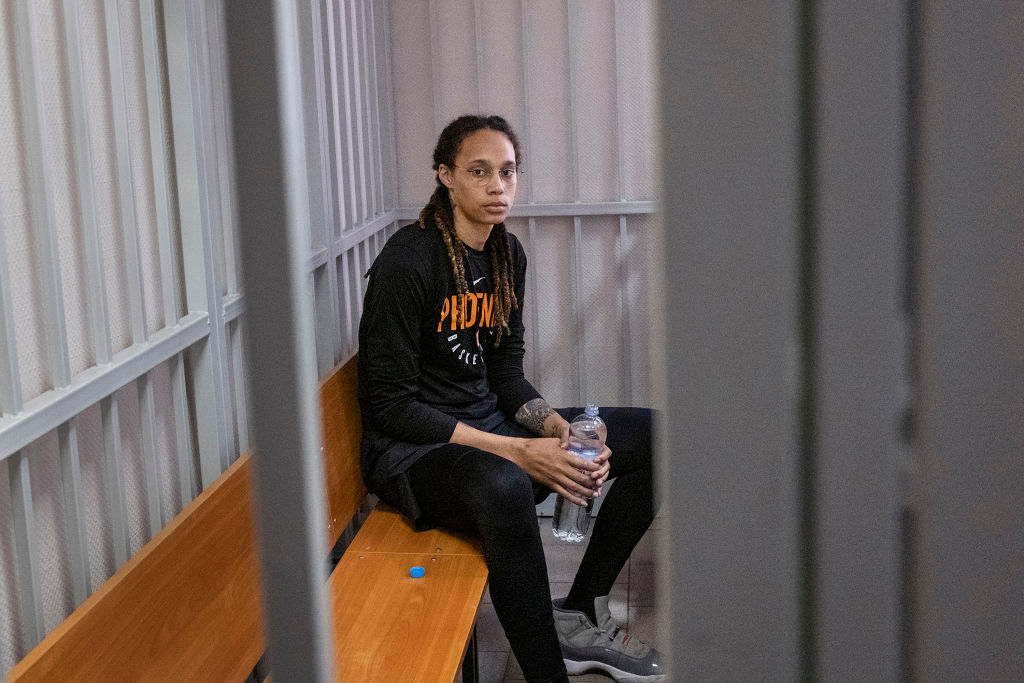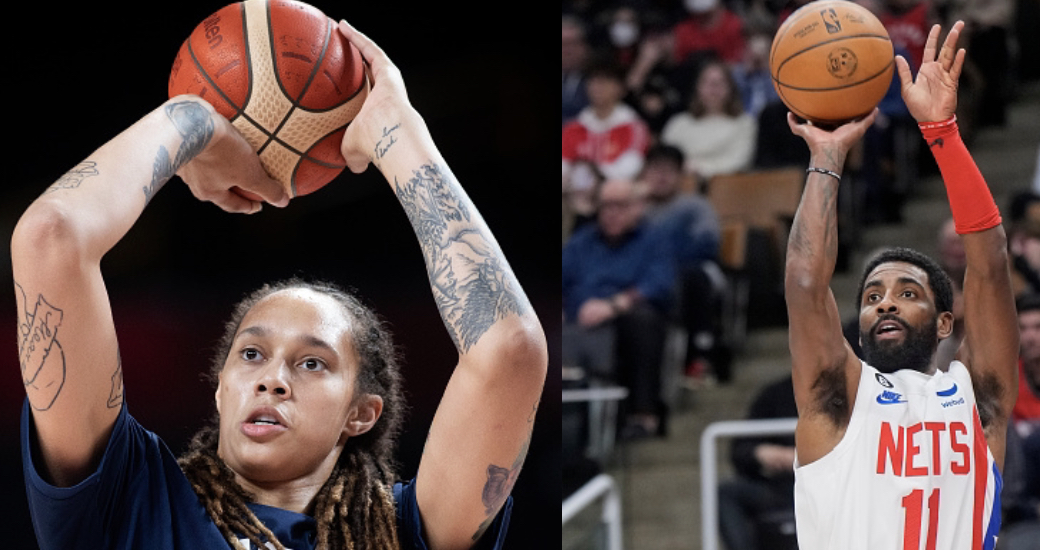
Source: The Washington Post / Getty
Dear Black Men,
Black women have questions—on how gender, and not necessarily race, informs who you choose to protect, advocate for and who you throw to the fire. Brittney Griner’s arrest, incarceration and release made it so plain.
Why is it that so many of you were noticeably silent surrounding Brittney Griner’s unjust detainment, while she was caught in a greater war, kept essentially hostage by the Russian government as a power play to the U.S. for imposing sanctions due to the invasion of Ukraine in Russia, yet rallied around Kyrie Irving and his rightfully scrutinized intimations around antisemitism with support and those #IStandWithKyrie tweets?
Why don’t you stand with Black women the way Black women stand for you? Real question.

Source: Getty / Getty
Here we have Brittney and Kyrie: The tale of two Black basketball stars and two topical issues that resulted in punitive action. We have countless men who took to social media against the “punishment” Kyrie Irving received for refusing to apologize and condemn antisemitic rhetoric after publicizing a film known for spreading harmful messaging. Despite being given the opportunity and grace to clarify his thoughts, and perhaps own up to his mistake, Irving doubled down on his choices, stating he “cannot be antisemitic if I know where I come from.”
His (in)action led to his subsequent suspension, brewing an “#IStandWithKyrie” social media campaign.
Black men came together fervently when they felt one of their own was being unjustly vilified. Black Israelites protested in front of the Barclays Center, where the Brooklyn Nets play, and primetime sports analysts tweeted in support of it. Even Lebron James called “double standard” during post-game press conferences when reporters asked about Kyrie but skirted around questions on Jerry Jones. But hey, at least Brittney Griner got her name on a t-shirt to wear during warm-ups in lieu of an #IstandwithBrittney protest, right?
There were no mass Black male-led protests planned to advocate for her release.
But the beginnings of the Black Lives Matter movement, mainly enacted due to the egregious treatment of Black men at the hands of law enforcement, was spearheaded by Black women. In fact, the founders of the organization also happen to be Black women. Although the foundation has its own issues to address, at its core and its origins were a group of Black women wanting to enact change on behalf of its communal members. One of the founders, Patrisse Khan-Cullors, went on to form another organization, Dignity and Power Now, dedicated toward prison abolition.
And it expands into our media as well, with Black women taking on the duty of spreading the facts and the futures we, especially Black men, face in the era of mass incarceration. Michelle Alexander’s The New Jim Crow is one of the most popular books that brought this prevalent issue to mainstream focus.
Nikki Giovanni, renowned activist and writer, said it best in her conversation with acclaimed writer and activist James Balwin about the dynamics between Black men and women:
“Because I love you, I get the least of you.”
Black women need and deserve to be uplifted the same way we do Black men, because the issues that impact them are almost always intertwined with us as well.
Fortunately, like many Black men, Brittney Griner had a Black woman in her corner, and countless others who never forgot about her and fought fiercely for her freedom until the Biden Administration secured her freedom. If the President of the United States was steadfast around justice for Brittney, why weren’t Black men?
Real question.
If Black women had taken their foot off the pedal, Brittney Griner may still have been in a Russian prison camp to this day. This double standard is more than evident, and we see it play out in more ways than this. Because Black women are always on the margins, an entire submovement of BLM had to be created, #SayHerName, to bring focus to the Black women who are also victims of police brutality. This culminated in the advocacy for justice for none other than Breonna Taylor. If additional awareness was not created and sustained, her murderers may have never received consequences for their actions.
RELATED CONTENT: #SayHerName: Is Still A Light For Unseen Black Women In It’s 8th Year
Cyntoia Brown is another Black female victim of not only the criminal justice system, but sex trafficking as well. Since age 16, Brown spent 15 years in prison for killing a man she who paid for sex from her by her pimp. There were no Black men leading the charge for her release. Instead, we got Kim Kardashian, along with Black female activists who never forgot Cyntoia Brown’s name, which gained more visibility due to #MeToo and #SayHerName. Again, both being Black women-led advocacy campaigns.
Black men must hold one another more accountable, and be more than willing, but active in advocating for Black people who are more marginalized than themselves, such as women and LGBTQ+ individuals within our community.
Brittney Griner identifies as both.
She was criminalized globally. However, what’s really criminal is how Griner was used as a pawn in an intense geopolitical landscape, endured extreme imprisonment under harsh conditions and being under supported.
Black men will y’all ever stand with Black women the way Black women stand for you?
Real question.
RELATED CONTENT: People Who Are Big Mad Brittney Griner Is Free Don’t Value Black Women


0 Commentaires